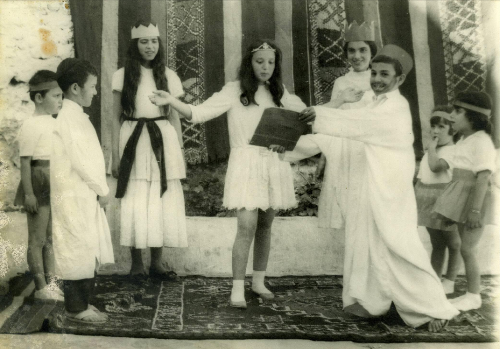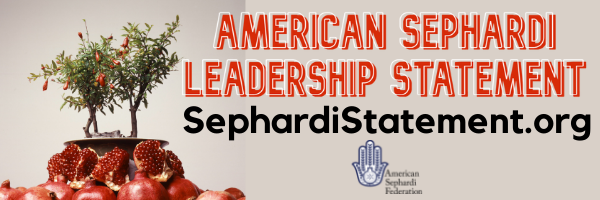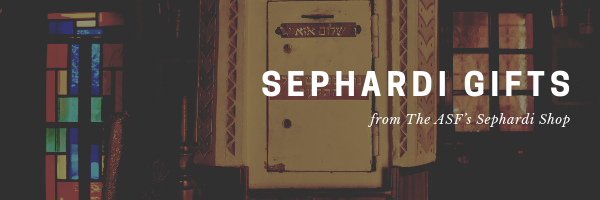Classic Sephardi Sages on Purim🎉: Costumes, Charity, & Communitas


Purim Alegre! !פורים שמח
From your friends at
The American Sephardi Federation
In honor of Purim, the ASF’s Sephardi World Weekly is pleased to offer the following “Letter from the Land of Israel”:
The holiday of Purim is distinguished by a number of fascinating customs and traditions. The most popular custom is to dress up in festive costumes, but, truth be told, this is a relatively recent practice dating back to Medieval times. Purim traditions with roots in the Talmudic and Biblical eras include giving charity, sending gifts of food to friends and acquaintances, participating in a festive meal, and listening to two public readings of the Megilat Esther (Book of Esther).
These Talmudic and Biblical traditions are practiced in a very particular way on Purim. Consider the giving of charity. The rule on Purim is to give charity to at least two people, but we are also highly encouraged to give charity to anyone who asks.
At first glance, this last directive is very strange. After all, when it comes to giving charity, the great Andalusian sage, Rabbi Moses ben Maimon (RAMBAM/Maimonides: 1135-1205), taught that the highest form of charity is to help someone become self-sufficient. In what way does indiscriminate giving help anyone become self-sufficient? Maimonides also teaches that charity is best given anonymously. The commandment to give to whomever asks obviously transgresses this rule, too.
Most fundamentally, however, Jewish law doesn’t obligate us to give charity to anyone who asks. We’re instead obligated to check, to the degree possible, that the person asking for charity is honestly presenting his or her needs.
How can we understand this strange aspect of the Purim holiday?
The great Spanish Talmudist, kabbalist, Biblical commentator, and physician, Rabbi Moses ben Nachman (RAMBAN/Nachmanides: 1194–1270), offers a very interesting answer in his commentary to the Talmudic tractate of Bava Metzia (78b): “We shouldn’t be fastidious [on Purim] and say, ‘this poor person is worthy,’ while, ‘this poor person isn’t worthy.’ Rather, we give to everyone so that everyone will share in our joy, whether the person is fitting or isn’t fitting. For it is written, ‘Days of feasting and joy,’ and it is also written, ‘giving presents of food to one another (and gifts to the poor)’ (Esther 9:22).”
According to Nachmanides, we give charity on Purim in order to share our joy with others, without inquiring into the worthiness of the recipient. He further understands that charity on Purim is an extension of the practice to send gifts of food to friends and acquaintances. Put together, this means that, from Nachmanides’ perspective, the charity that we give on Purim isn’t really charity in the conventional sense. We don’t give charity on Purim in order to help those in need. Rather, we give charity on Purim—to anyone and everyone who asks—in order to strengthen communal unity.
Nachmanides’ interpretation fits in with the entire tenor of the Purim holiday. The traditions of Purim—sending gifts of food to friends and acquaintances, participating in a festive meal, and listening to two public readings of the Book of Esther—all aim at strengthening our ties to our fellow Jews. Nachmanides teaches that we likewise give charity to anyone who asks on Purim in order to increase love between Jews. And in case one wonders if we aren’t liable to give to someone who isn’t worthy in the process, the answer, on Purim, is that every Jew is worthy of our love.
This perspective on the expansive character of the Purim holiday can help us to better appreciate, in turn, the relatively recent custom of wearing costumes on Purim. In strengthening communal unity, we break down boundaries and, to use the terminology of the 20th century sociologist, Victor Turner, create a liminal reality in which day-to-day hierarchies are dissolved and communitas, an unstructured feeling of communal togetherness, emerges in its place. Dressing-up in costume likewise contributes to creating this liminal, communal space.
As for the question of why this unstructured feeling of togetherness is fitting for Purim, the answer is very basic and, indeed, almost primal. On Purim, all Jews were in danger of becoming victims of Haman’s genocidal plan. Haman didn’t distinguish between different kinds of Jews or Jewish communities; he wanted to annihilate them all. But all Jews, without distinction, benefited from the miraculous turn of events in which Haman’s plan was frustrated and the Jew people emerged triumphant. Purim traditions also encourage us to strengthen our connection to all Jews, without distinction. The American Sephardi Federation wishes all of our friends a festive Purim filled with communal joy and togetherness. If there’s one thing that we can learn from antisemites like Haman, it’s that they don’t make distinctions between Jews. In our basic love for other Jews, we shouldn’t make any distinctions, either.
Purim Sameach!
The American Sephardi Federation

~~~~~~~
Photo credit: “La scène d’Esther,” Alliance Israélite Universelle, Inezgane, Morocco, Date Unknown (Photo courtesy of Ben Saïd Mohamed/AIU Library)
~~~~~~~

The American Sephardi Federation invites all individuals, communities, and organizations who share our vision & principles to join us in signing the American Sephardi Leadership Statement!
Please also support the ASF with a generous, tax-deductible contribution so we can continue to cultivate and advocate, preserve and promote, as well as educate and empower!
~~~~~~~

From Generation to Generation: a Legacy of Faith and Tolerance
By David S. Malka
From Generation to Generation: a Legacy of Faith and Tolerance is dedicated to the memory of Rabbi Shlomo Malka. It honors his memory as a Jewish scholar, a spiritual leader, and a great humanitarian.
David S. Malka is publishing this text as his personal contribution to legacy of Malka family, in the hope that this generation will re-discover their patriarch’s teaching and advance his message of faith and compassion on to the next generation.
From Generation to Generation: a Legacy of Faith and Tolerance is a message of love, tolerance, and pride in one’s heritage.
by Devorah Michael
This is a unique Mezuzah handmade in the Spanish and Mexican tradition of Talavera pottery – the first of its kind.
Devorah Michael focuses on offering high-quality, Mexican Judaica products that represent the beauty of both cultures. All products are 100% Mexican 100% Jewish and 100% unique!
All products are handmade by experienced artisans whose craft has been perfected over centuries of hard work and dedication.
Talavera is a colorful, handmade, style of artisan pottery present in Spain and Mexico. Authentic Talavera pottery originates in only two places: Talavera de la Reina in Spain and San Pablo del Monte in Mexico. In order for Talavera to be deemed authentic, not only must it originate from the previously mentioned places, but it can only be produced in six colors: blue, yellow, black, green, orange, and mauve. Such colors can only come from natural pigments.
~~~~~~~
Upcoming Events or Opportunities
The ASF Institute of Jewish Experience, together with Kulanu and Genie Milgrom present:
Finding Judaism Across Africa and Central American
Communities across Africa and Central America are returning to their Jewish roots or finding Judaism. They are seeking out religion and a connection to the larger Jewish world, many with a view towards their own Sephardi ancestry and others through an affinity for the Sephardi rites.
Representatives of these communities, documentarians, and activists will come together to share their experiences and the unique interactions of these communities and the greater Sephardi world traditions.
The program will open with a photo exhibit in the Great Hall.
Sunday, 12 March 10:00AM – 4:00PM EST
At the Center for Jewish History
(Tickets: In-person $36; Via Zoom $15)
Sign-up Now!
Sign-up for Zoom Now!

We will host scholars and leaders of these emerging communities from Africa and Central America that will discuss their connections to Judaism and their Sephardi influences.
Featuring:
Professor Tudor Parfitt, emeritus of modern Jewish studies in the University of London, senior associate fellow at the Oxford Centre for Hebrew and Judaic Studies, distinguished professor at Florida International University
Professor Shalva Weil, senior researcher at Hebrew university, distinguished professor at Jawaharlal Nehru University, research fellow at University of South Africa, prolific writer and lecturer on Indian Jews, Ethiopian Jews, lost tribes, and femicide
Joseph F. Lovett, producer, director, writer. Director of Children of the Inquisition, 2019.
Engr. Jator Abido (Yatov ben Yisrael), Nigerian representative to the Sub Sahara Africa Jewish alliance
Patricio Serno, filmmaker and co-founder of Casa Tova, Mexico
and more.
Sponsorship opportunities available:
~~~~~~~
The Belzberg Program in Israel Studies at the University of Calgary and the Schusterman Center for Israel Studies at Brandeis University. With the collaboration of the American Sefardi Federation, Centro Sefarad Israel, and the International Network for Jewish Thought present:
Sephardi Modernities Seminar Series, 2023
Join us as we explore the relationship between our narratives about the past and the future to which we aspire. The ways in which scholars approach the stories, events, characters, and historical processes of the Sephardi/Levantine past are inevitably guided by values, by their moral and political beliefs. Which elements of the past do they strive to preserve, reclaim and grant continuity? What are they trying to say about a potential future? Which stories become part of canonized history, and which ones are dismissed as mere anecdotes? Which theoretical, social, political, and cultural frameworks do they wrestle with, and which do they seek to advance?
On Zoom
(Registration is required for each session)
14 March at 12:00PM EST
Preservation of Jewish Heritage and Debating Egypt’s Past and Present
Yoram Meital, Ben-Gurion University of the Negev
Sign-up Now!
23 March at 12:00PM EDT
How Do Judeo-Spanish Proverbs and Tales Communicate with Us and How Do We Communicate With Them?
Lital Belinko-Sabah, Hebrew University of Jerusalem
Sign-up Now!
18 April at 12:00PM EST
‘Modernity’ and ‘Tradition’ on the Move: Spanish Moroccan Jews and their Diasporas
Aviad Moreno, Ben-Gurion University of the Negev, in conversation with Angy Cohen, University of Calgary
Sign-up Now!
9 May at 12:00PM EST
Sephardi Musical Modernities: Listening to the Past in the Future
Edwin Seroussi, Hebrew University of Jerusalem
Yair Dalal, Composer, violinist, oud player, singer, and teacher
Sign-up Now!

Throughout this year’s series we will discuss the future invoked by each way of looking at the past, the political agendas of historical research, and the values that unavoidably guide scholastic inquiry. Topics include the transmission of narratives among collectives and among researchers, ownership of archives, encounters with the past, the academic legitimacy of certain topics and collectives, vehicles of memory (music, oral history, proverbs, etc.) and the construction of historical narratives.
Organized by Dr. Angy Cohen, Inaugural Hy and Jenny Belzberg Postdoctoral Associate in Israel Studies, Department of Anthropology and Archaeology at the University of Calgary, and Dr. Yuval Evri, Assistant Professor of Near Eastern and Judaic Studies on the Marash and Ocuin Chair in Ottoman, Mizrahi, and Sephardic Jewish Studies, Brandeis University.
~~~~~~~
The ASF Institute of Jewish Experience presents:
Diary of a Black Jewish Messiah
Discover a true story of imperial rivalry, Mediterranean Jewish communities, a Jewish kingdom, & one black messiah!
Professor Alan Verskin will share the world into which the semi-messianic figure, David Reubeni, peddles his vision of an autonomous Jewish country in the Holy Land.; a world filled with fierce rivalries between Christian and Muslim powers, brutal conquest, and fantastic discovery.
A panel discussion will ensue with Professors Alan Verskin, Ronnie Perelis, and Francesca Bregoli followed by Q&A.
Thursday, 16 March at 6:00PM EST
At the Center for Jewish History
(Tickets: $15 suggested donation)
Sign-up Now!

In 1524 David Reubeni, also known as the “black messiah,” arrived in Venice, claiming to be the ambassador of a powerful Arabian Jewish kingdom. In an era of fierce imperial rivalry, and the fantastic discovery and brutal conquest of new lands, people across the Mediterranean saw signs of an impending apocalypse and dreamed of discovering new allies to join them in the coming war. Reubeni offered a Jewish take on these expectations. With his warriors from lost Israelite tribes, he pledged to recover the Holy Land and restore Jewish pride. Numerous Jews and conversos hailed him as the messiah.
Diary of a Black Jewish Messiah (Stanford University Press, 2023) is the first English translation of Reubeni’s Hebrew diary.
Alan Verskin is Associate Professor of Jewish and Islamic History at the University of Rhode Island. His most recent book is A Vision of Yemen: The Travels of a European Orientalist and his Native Guide (Stanford University Press, 2019).
Francesca Bregoli, Joseph and Oro Halegua Chair in Greek and Sephardic Jewish Studies, is Associate Professor at Queens College and The Graduate Center, where she serves as Director of the Center for Jewish Studies. Her research focuses on early modern Italian and Sephardic Jewish history. She is the author of Mediterranean Enlightenment: Livornese Jews, Tuscan Culture, and Eighteenth-Century Reform (Stanford University Press, 2014; National Jewish Book Award finalist in the categories of Sephardic Culture and Writing Based on Archival Material).
Co-Sponsored by the Diasporas Project at the Rabbi Arthur Schneier Program for International Affairs at Yeshiva University and The Center for Jewish Studies at the Graduate Center, CUNY and Bernard Revel Graduate School or Jewish Studies
Sponsorship opportunities available:
~~~~~~~
The Posen Library of Jewish Culture & Civilization with Congregation Shearith Israel, Center for Jewish History, American Jewish Historical Society, Leo Baeck Institute, and the American Sephardi Federation present:
The Early Modern Period, 1500-1750, Volume 5
“Join Professors Deborah Dash Moore, Elisheva Carlebach, Francesca Bregoli, and Mayer Juni to celebrate the publication of The Early Modern Period, 1500-1750, Volume 5 of The Posen Library of Jewish Culture and Civilization edited by Yosef Kaplan. The discussion will present fascinating dimensions of Jewish culture and civilization across three centuries from 1500 to 1800.”
Featuring a short performance by the Shearith Israel Choir and a panel discussion with distinguished Jewish historians.
Followed by a reception in the Levy Auditorium
Thursday, 23 March 23 at 7:00PM EST
(Complimentary RSVP)
Congregation Shearith Israel, Main Sanctuary
2 West 70th Street at Central Park West, New York City
Sign-up Now!

“Accessibility: The landmark synagogue building does not have an elevator. We do have people on hand to provide mobility assistance, including with the aid of a wheelchair climber that can take wheelchair users upstairs to the Sanctuary and downstairs to the Levy Auditorium. Please let us know if you expect to need assistance.”
~~~~~~~
TriBeCa Synagogue presents:
Mexican Jewish Film Festival 2023
(First Edition)
A retrospective on Mexican films: directed, created, written, acted or produced by Mexican Jews.
2-5 April 2023 | TriBeCa Synagogue
49 White Street, New York City
Sign-up Now!
(Please use a promo code ASF2023 to receive a special 20% off discount)

Sponsorship opportunities available

~~~~~~~
ASF Broome & Allen & ADL Collaborative for Change Fellow Isaac de Castro presents:
Entre Diasporas: Telling the Latin-American Jewish story. Contando la historia judía latinoamericana

Tell your story. Cuenta tu historia.
We’re looking for first-generation Latino Jews in the United States who immigrated because of political and social turmoil. Jews of Sephardic descent from Colombia, Cuba, and Venezuela that now reside in the Miami area will be given priority, but others are welcome to apply as well.
Fill out this form to be considered as an interviewee for this project. After you’ve submitted, we will be in touch promptly to set up a preliminary phone call.
Click here for more information.